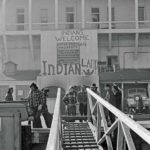Photo by Eli Pace / Sky-Hi News
During a virtual panel discussion Thursday afternoon, Colorado officials emphasized a need for more cooperation among federal, state and local actors in Colorado’s fight against wildfires.
Rep. Joe Neguse, who serves Colorado’s 2nd Congressional District, hosted a public listening session Thursday, Feb. 18, to gain insights on the impacts and potential solutions to combat growing concerns about wildfires in the state. The session featured a panel discussion between Neguse, Gov. Jared Polis, Colorado Department of Public Safety Director Stan Hilkey and Sens. John Hickenlooper and Michael Bennet.
In the wide-ranging discussion, officials shared their perspectives on the changes necessary to protect Colorado’s public lands, property and lives, and they turned to residents for questions and to share their experiences with local wildfires in recent years.
“It doesn’t escape me that the most devastating fires of 2020 burned at a time of the year when snow should be falling,” Neguse said. “Clearly, with the impacts of climate change, the need to promote healthy forests, the impacts on watershed health and the need to protect homes and businesses, wildfires are just a complex issue for our communities. There really is no silver bullet, which is why these conversations are so important so that we can all candidly talk about what steps we might be able to take in the Congress and the Senate, and of course here in Colorado, working together to solve these incredible challenges.”
The challenges indeed are incredible. The state saw the three largest wildfires in its recorded history last year — the Cameron Peak Fire, East Troublesome Fire and Pine Gulch Fire — which scorched nearly 550,000 acres across the state, burning down hundreds of homes and claiming the lives of two Coloradans. Looking back on the destruction, exacerbated by climate change and historically poor forest management tactics, officials promised to work toward comprehensive and holistic solutions.
One prevailing theme throughout the session was a need for more robust national support for Coloradans and other Americans throughout the West dealing with a new age of megafires. Bennet said the issue would require a hegemonic shift in understanding about the dangers wildfires pose to the state’s infrastructure, environment and economy.
“One of the most important things we can do is change the way Congress thinks about our forests,” Bennet said. “Politicians in Washington need to understand that in Colorado, and across the West, forests are our infrastructure. They are as important to our state’s economy as the Lincoln Tunnel is to New York. But the truth is we have major challenges with this infrastructure. We’re now dealing with the consequences of a century of fire suppression and chronic underfunding for the Forest Service. When you combine that with climate change, it’s put the agency and state and local governments in a nearly impossible position. …
“We’re paying for wildfires after they happen rather than investing on the front end. That’s fiscally irresponsible, and … we need, I think, a major shift at the national level to prioritize forest restoration and wildfire mitigation — and a major investment to go with it.”
Bennet pointed to his bill, the Outdoor Restoration Force Act, which he said would spur a $40 billion federal investment in forest health, watershed restoration and climate resilience projects across the country; provide $20 billion in funds allocated to state and local governments; and create 2 million jobs in rural areas. Neguse also discussed the 21st Century Conservation Corps for Our Health and Our Jobs Act, which would allocate billions of dollars in funds to restore public lands and watersheds, improve forest health and reduce wildfire risks, among other endeavors.
Officials also highlighted the importance of local initiatives in the wildland-urban interface to mitigate wildfire risks. Polis likened at-home perimeter defense — like removing trees and building firewise homes — to biblical tales of Israelites marking their doors with lamb’s blood before the 10th plague on the Egyptians, saying that homeowner mitigation efforts can help the “angel of destruction” that is a wildfire pass over.
Hilkey lauded local governments like Summit County for its efforts to create fire breaks that helped to curb destruction during the 2018 Buffalo Mountain Fire, but he said focusing on the state’s ability to fight fires was equally important to protect communities.
“They had done an enormous amount of mitigation around the subdivision, but it alone did not save the subdivision,” Hilkey said. “It was also an aggressive initial attack. In any public policy conversation we have about wildfire in the American West, there’s sort of two major topics of conversation: mitigation and suppression. … Much of the time, it seems that people often try to choose one side or another. I want to encourage us all to resist the urge to do that and understand that mitigation and suppression need our full support. They’re symbiotic to a successful Colorado future when we’re talking about wildland fire.”
Prompted by questions from the public, Hilkey and other officials also discussed a need to work with communities to develop responsibly so chokepoints aren’t created during potential evacuations, and to work with local governments and emergency agencies to study and train for mass evacuations to ensure they can be done smoothly and safely.
Members of the public also asked for better information during wildfires to keep residents informed about the status of their homes and properties, more support and funding for firefighters, better recovery efforts for those who’ve lost their homes or livelihoods, and help working with insurance companies to make sure homeowners can be made whole again.
Officials promised to take the conversation to heart as they return to their duties.
“We’re in a place where we’ve got a decision to make about whether we’re going to stand up for the next generation of Coloradans and Americans and leave a legacy that matters,” Bennet said. “When you stand in a forest … that’s been treated the way it ought to be treated, it starts to look a little more like a forest might have looked when Native American people were in Colorado. It’s like standing in a cathedral. That could be our legacy if we pull together and really do the work that needs to be done. I’m grateful for this. This is a good, inspiring moment for us to take back to Washington and get to work.”
Courtney Walsh, a Boulder resident who lost her home in the Calwood Fire, called on all Coloradans to come together to deal with the growing problem.
“We feel really lucky,” Walsh said. “We have our lives. We have our family and friends. We can’t imagine getting through it without this amazing Boulder community. But I wouldn’t want anyone to go through what we’ve gone through. … All of us together have to work together to prevent future wildfires.”
This content was originally published here.




